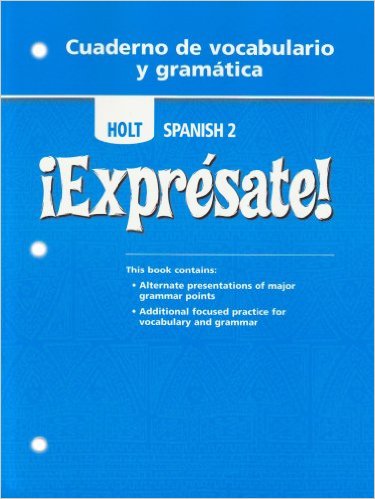
All Solutions
Page 82: Gramatica
2) estábamos
3) teníamos
4) íbamos
5) leía
6) buscaba
7) sabíamos
8) cerraba
In this case, we could use the imperfect of several verbs such as *celebrar*, *cenar* or *estar*.
| Spanish|English |
|–|–|
|celebraban. | were celebrating |
| cenaban. | were dining. |
| estaban. | were. |
To describe that they were happy, we could use verbs such as *estar*, *ver* or *parecer*.
| Spanish|English |
|–|–|
|Estaban. | They were. |
|Parecían. |They seemed. |
|Se veían. |They looked. |
In this case, given the context, it is most likely that they are talking about how they were waiting for the food. For this, we will use the verbs *traer* and *esperar*.
|Spanish | English|
|–|–|
|traían – esperaban. | was brought – they waited. |
In this case, as we are already talking about the end of the meeting, we must use the verb *ir* as it is the most appropriate.
|Spanish |English |
|–|–|
| iban. | were leaving. |
The words given for each sentence will be placed in parentheses.
For this sentence we must conjugate the verb *preferir* (to prefer) in the imperfect, and the verb *hornear* (to bake) in the present tense.
|Spanish | English|
|–|–|
|prefería freír la comida – la hornea. | preferred to fry food – she bakes it. |
In this case, we must conjugate the verb *comer* (to eat) first in the imperfect and then in the present.
In addition, since we are comparing the present with the past and we know that now the person eats less fast food, we can use the adverb *mucha* to describe that before she ate a lot of fast food.
| Spanish|English |
|–|–|
|comía mucha comida rápida – como menos. | I ate a lot of fast food – I eat less. |
In this case, we have to conjugate the verb *probar* (to taste) in the imperfect and the verb *ser* (to be) in the present tense.
Similar to the previous sentence, this one refers to him being a vegetarian now, so he must eat a lot of vegetables (*verduras*). To emphasize that in the past it was the opposite, we can use the adverb *muchas* to express that he did not taste many vegetables.
| Spanish| English|
|–|–|
| probaba muchas verduras – es vegetariano. | did not taste many vegetables – he’s a vegetarian. |
In this sentence we must conjugate the verb *echar* (add) first in the imperfect and then in the present tense.
|Spanish |English |
|–|–|
| le echaba mucha sal – echo poca. | added a lot of salt – I add little. |
Remember that to form the past participle, we must replace the endings of the verbs by -ado (if they end in -ar) or by -ido (if they end in -er or -ir).
Since we are talking about chops (*chuletas*), we must think of verbs whose past participle works as an adjective to describe how the chops are.
Some verbs we could use are *congelar/congelado*, *cocer/cocido*, *quemar/quemado*. Let’s see examples for the answer:
|Spanish |English |
|–|–|
|No, aún están congeladas. | No, they are still frozen.|
|Sí, ya están cocidas. / No, aún no están cocidas. | Yes, they are already cooked. / No, they are not cooked yet.|
| No, están quemadas. / Sí, pero están quemadas.| No, they are burned. / Yes, but they are burned.|
To answer this question, we need to think of verbs whose past participle works as an adjective to describe how the chicken was prepared. Some verbs can be *asar*, *hornear* or *freír*, which has an irregular past participle.
Let’s see the possible answers with these verbs:
|Spanish |English |
|–|–|
|Sí, lo preparé asado. | Yes, I prepared it roast.|
|No, aún no está horneado. / Sí, ya está horneado. | No, it is not yet baked. / Yes, it’s already baked.|
|Sí, lo preparé frito. | Yes, I prepared it fried. |
In this case, we must answer how we like eggs. The three most common ways to prepare it are fried, boiled or scrambled. To describe these forms, we must use the verbs *freír*, *hervir* or *revolver*, which has an irregular past participle.
| Spanish| English|
|–|–|
| Me gustan fritos. | I like them fried.|
| Me gustan hervidos.| I like them boiled. |
| Me gustan revueltos. | I like them scrambled. |
In this case, since we are being asked if we add the whole onion to the soup, we can answer by using the past participle of *cortar*, to indicate that we do not add it whole but chopped. Let’s see an example answer:
|Spanish |English |
|–|–|
| No, añado la cebolla cortada. | No, I add the chopped onion. |

